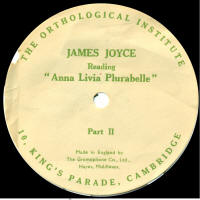Label Description
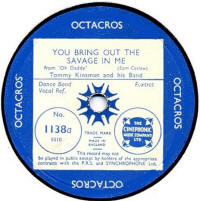
A listing of British Odeon records, compiled by Mike Langridge is available from the CLPGS.
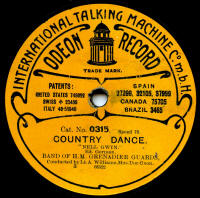
Top Note
During this time he also sold records overstuck with his own label on the upper half, obliterating the original label's name. The few examples I've seen were Polyphon Records, most likely old-stock (which were also sold by Lugton's).
It is unlikley, in my opinion, to be due to the outbreak of WWI, since the place of manufacture (Germany) is still visible at the foot of the labels.
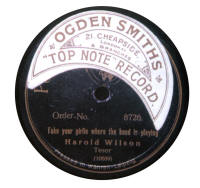
Thanks to Bill Dean-Myatt for providing the label image.
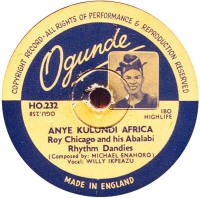
From 1919 and for probably a very short period afterwards, Okeh records, both lateral and vertical cut, were imported to Britain. The Phono Exchange in Cardiff, was reported to be the only place selling OkeH records at this time, with prices of 2/6 for vertical-cut records and 3/6 for lateral.
They rarely turn up, but are recognisable by the British copyright stamp affixed to the label. From 1922-23, Okeh masters were available in Britain on Parlophone.
The image, right, is courtesy of Norman Field from his excellent website, http://early78s.uk/.
It had not been found out who these records were produced for, but the label's design is almost identical to the CLAUSOPHON label made in Germany For Clemens Claus, owner of The Clausophon Company. The significance of this is unknown, but the OLIVER name and design were registered in Germany, though not in Britain.
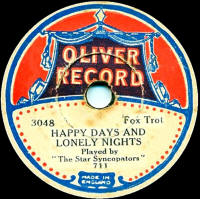
There were three series produced; all were manufacture by The Crystalate Manufacturing Company.
The first series used Grammavox masters (Sound Recording Compamy) and had a violet label with gold printing and had JA- prefixed catalogue numbers. These date to just prior to WWI.
The second series dates from 1919 to about 1922. These used "Popular" masters which also belonged to the Sound Recording Company. The catalogue series ran from 100, with no prefix. The labels were usually red, but, like Popular, the colour could vary depending on the paper the company could get.
Finally, in the mid-1920s the label made its third appearance, the masters now being Crystalate's own, also issued on Imperial. Just to confuse things, these also used a 100- series catalogue range. The labels were red with gold printing (similar in style to the second image here). Many, if not all, are just pasted over standard Imperial pressings. Sometimes these have the same catalogue number as the original Imperial issue.
Thanks to Rainer Lotz for the scan of the pale blue/green style, and to
Norman Field for the 1920s paste-over image.
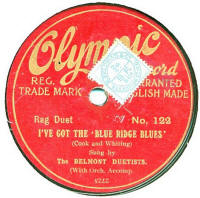
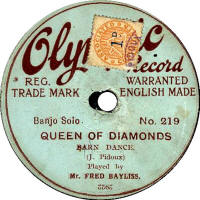
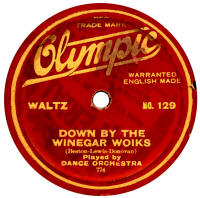
I don't know who sold these, but notably there are no catalogue numbers and the paste over has an area cut out so as to show the details of the record.
Thanks to Rainer Lotz for the image.
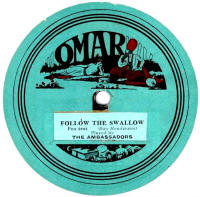
They were pressed in Germany from Bel Canto, Beka (and other) masters during 1913-14.
The labels state various places of manufacture in Germany, implying that more than one company was making these records.
The London agent was The Operaphone Company Ltd, of 23, City Road, London, a district that seemed to have been stuffed with record & gramophone businesses at this time.
Ther are two known designs of thr label, one showing a winged cherub, which prompted The Gramophone Company to sue for trade mark infrigement, since they used a similar image on their records. This may explain the change of design of Operaphone records.
The outbreak of WWI caused closure of the business. Over 276 10" records and about 76 12" records had been issued on Operaphone.
Thanks to Bill Dean-Myatt and Rainer Lotz for providing the label photos.
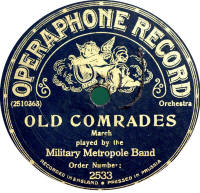
I've no idea of the date of this record; it could be any time in the 1940s to 1960s! Orbis was founded in 1944, mainly for publishing Polish books..
Thanks to Paul Buck for providing the label photo.
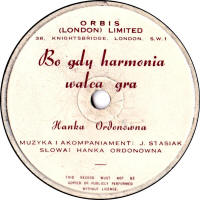
The first of 4 different series of Oriole records were released in May & June 1927, and 15 different records were released, though the recordings generally dated from a year or two earlier. They were all from American Vocalion's "race" catalogue and numbered 1000 to 1012 plus 2000 and 2001 for 4 sides by white cabaret artists.
The P-100 series dates from the early 1930s and the label is either gold (see example) or silver.
In the mid-1930s, there
was a short-lived LV-100 series, gold labelled with the same design as
the earlier 30s P- series. These were re-issued in the 1950s as
LB-series, using the original masters and a new-design of label in Black
with silver printing.
Then in the 1950s, they used a CB-catalogue series, reissuing (again)
the 1930s sides and then also new recordings, selling for 5/9.
Levy's Oriole company also made personal/private recordings on request, and these generally have an orange and gold label.
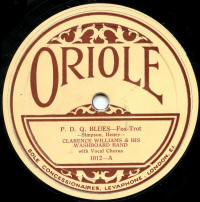
The EMI files state that these recordings (plus one other by Sir Richard Paget reading George Bernard Shaw) were mde for Mr. C.K. Ogden on behalf of The Linguaphone Institute.
This is the only one reported; it seems to have been a one-off special.
Thanks to Bill Dean-Myatt for providing the label image.
